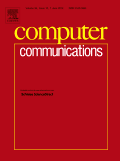
COMPUTER COMMUNICATIONS
Scope & Guideline
Elevating Knowledge in Computer Communications
Introduction
Aims and Scopes
- Network Security and Privacy:
Research related to securing communication networks, including intrusion detection systems, privacy-preserving protocols, and techniques to mitigate various types of cyber attacks. - Wireless Communication and Networking:
Studies focusing on various aspects of wireless technologies, including but not limited to IoT, UAV communications, 5G, and beyond, as well as protocols and optimizations for these networks. - Resource Management and Optimization:
Investigations into efficient resource allocation strategies for networks, including load balancing, energy efficiency, and task offloading in edge computing environments. - Blockchain Technologies in Networks:
Exploration of blockchain applications in network security, access control, and data integrity, addressing the challenges and opportunities of integrating blockchain with existing network architectures. - Machine Learning and AI in Networking:
Application of machine learning and artificial intelligence techniques for enhancing network performance, anomaly detection, and predictive maintenance. - Quality of Service (QoS) and Quality of Experience (QoE):
Research focused on ensuring optimal user experiences through QoS and QoE metrics in various networking contexts, including multimedia and IoT. - Network Protocols and Architectures:
Development and analysis of new protocols and architectures for improving communication efficiency, reliability, and scalability in diverse networking scenarios.
Trending and Emerging
- Edge Computing and Multi-Access Edge Computing (MEC):
Research on edge computing is rapidly increasing, focusing on how to optimize resource allocation and task offloading in proximity to end-users, enhancing performance and reducing latency. - Integration of AI and Machine Learning:
There is a significant trend towards utilizing AI and machine learning techniques to improve network management, predictive maintenance, and anomaly detection, reflecting a broader industry shift. - 5G and Beyond Technologies:
Research focusing on the challenges and advancements of 5G networks, including resource slicing, network management, and new application scenarios such as smart cities and industrial IoT. - Blockchain Applications in Networking:
Emerging studies are increasingly exploring blockchain technology for enhancing security, privacy, and trust in communication networks, paving the way for decentralized applications. - Internet of Things (IoT) Innovations:
With the proliferation of IoT devices, research is trending towards developing protocols and frameworks that can effectively manage and secure the communication among these devices. - Cybersecurity in Emerging Technologies:
A growing focus on cybersecurity measures specifically tailored for new technologies such as IoT, 5G, and edge computing, addressing unique vulnerabilities. - Quality of Service (QoS) and Quality of Experience (QoE) Enhancements:
Research is increasingly aimed at optimizing user experiences in multimedia streaming and other applications, focusing on metrics that improve satisfaction in real-time communication.
Declining or Waning
- Traditional Networking Protocols:
Research on legacy protocols and older networking standards is becoming less frequent as the focus shifts to modern and emerging technologies such as SDN, NFV, and 5G. - Local Area Networking (LAN) Technologies:
Studies specifically targeting traditional LAN technologies are waning as research increasingly emphasizes wide area and mobile networks, particularly in the context of IoT and cloud computing. - Static Resource Allocation Models:
Static approaches to resource allocation are being replaced by dynamic and adaptive models that better suit the needs of modern, heterogeneous networks. - Basic Cybersecurity Measures:
While cybersecurity remains a core focus, basic measures such as firewalls and simple encryption techniques are being overshadowed by more advanced, adaptive security frameworks. - Theoretical Models without Practical Applications:
Research that remains purely theoretical without practical implementations or real-world applications is seeing reduced interest, as practitioners seek actionable insights.
Similar Journals
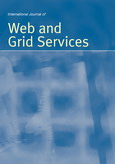
International Journal of Web and Grid Services
Connecting academia and industry through cutting-edge research.International Journal of Web and Grid Services, published by INDERSCIENCE ENTERPRISES LTD, is a distinguished platform for innovative research in the realms of Web Services, Grid Computing, and Distributed Systems. Established in 2005, the journal has consistently provided a forum for groundbreaking studies, catering to the evolving needs of academia and industry professionals alike. As of 2023, it is positioned in the Q3 quartile in both Computer Networks and Communications and Software, showcasing a notable impact within the field. Researchers will find this journal instrumental in disseminating knowledge, driving advancements, and fostering collaboration in the rapidly changing technological landscape. Although it currently does not offer open access options, its commitment to high-quality peer-reviewed content ensures that it remains a vital resource for those seeking to stay at the forefront of web and grid services research. With an audience comprising both seasoned scholars and emerging professionals, the International Journal of Web and Grid Services continues to be pivotal in shaping ongoing discourse and innovation.

Frontiers in Communications and Networks
Advancing the Future of Digital CommunicationFrontiers in Communications and Networks is a prominent open-access journal published by FRONTIERS MEDIA SA, established in 2020 and positioned in the heart of Switzerland. As an interdisciplinary platform, it focuses on advancing research related to computer networks, communications, and signal processing, providing a critical forum for innovative findings and developments in these rapidly evolving fields. With an impressive Q1 ranking in Computer Networks and Communications and a Q2 ranking in Signal Processing as of 2023, this journal is highly regarded among scholars and practitioners seeking to disseminate their work to a broad audience. By offering open-access options, it ensures that the research is widely available, fostering collaboration and knowledge sharing across the globe. Researchers, professionals, and students are encouraged to engage with the journal as it aims to encapsulate the burgeoning advancements shaping our digital communication landscape.
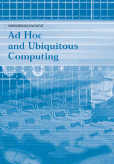
International Journal of Ad Hoc and Ubiquitous Computing
Unraveling the Future of Ubiquitous TechnologyThe International Journal of Ad Hoc and Ubiquitous Computing, published by InderScience Enterprises Ltd, is a premier platform dedicated to advancing the fields of computer networks, communication systems, hardware, and software architecture. Since its inception in 2005, this journal has served as a critical resource for researchers, professionals, and students aiming to explore the intricate dynamics of ubiquitous computing and ad hoc networks. Though currently not an open-access journal, its scholarly contributions are well-recognized, as evidenced by its rank in the Scopus database, which places it within the lower quartiles of its respective categories. With an increasing focus on innovative solutions in computer science, the journal aims to facilitate knowledge dissemination and encourage interdisciplinary collaborations. Researchers are particularly drawn to the journal for its comprehensive coverage of emerging technologies, making it an invaluable asset in a world increasingly reliant on sophisticated communication infrastructures. As it continues to thrive towards 2024, the journal remains committed to fostering a vibrant academic community.

Proceedings of the ACM on Measurement and Analysis of Computing Systems
Exploring the Nexus of Measurement and System ReliabilityProceedings of the ACM on Measurement and Analysis of Computing Systems, published by the Association for Computing Machinery, is a pivotal journal in the realms of Computer Science and Engineering, particularly esteemed for its comprehensive focus within the fields of Computer Networks and Communications, Hardware and Architecture, and Safety, Risk, Reliability and Quality. With an impactful presence since its convergence in 2019—and now spanning from 2021 to 2024—this journal upholds rigorous standards, reflected in its classification as Q1 in Computer Science (miscellaneous) and in key safety-related categories. Researchers and professionals will find the journal's emphasis on measurement and analytical solutions critical for advancing computational efficiency and system reliability in real-world applications. The journal does not currently have open access, maintaining its academic rigor and exclusive content that aims to serve the tech-savvy community dedicated to exploring and addressing the challenges within modern computing systems. With Scopus rankings demonstrating a steady impact in the field, particularly recognised within safety and reliability domains, the Proceedings of the ACM stands as an indispensable resource for those seeking to deepen their expertise and contribute to the evolving landscape of computing research.
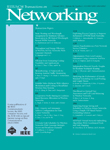
IEEE-ACM TRANSACTIONS ON NETWORKING
Transforming Ideas into Networking SolutionsIEEE-ACM Transactions on Networking, published by the esteemed IEEE-Institute of Electrical and Electronics Engineers Inc., stands as a pivotal source of research within the realms of Computer Networks and Communications, Computer Science Applications, Electrical and Electronic Engineering, and Software. With an impressive impact factor and recognized as a Q1 journal across multiple categories in 2023, it ranks among the top journals in its field, reflecting its influential scholarship and rigorous peer-review process. The journal has been continuously published since 1993 and features cutting-edge research that addresses the complexities and advancements in networking technologies. While it does not offer open access, its research is accessible through various academic platforms, ensuring that scholars, practitioners, and students can engage with and benefit from its rich content. The Scopus ranking further highlights its significance, with notable percentiles in engineering and computer science disciplines. This journal is essential for anyone seeking to stay ahead in the rapidly evolving area of networking.
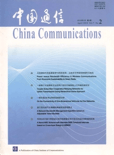
China Communications
Elevating Knowledge in Telecommunications and EngineeringChina Communications is a prestigious peer-reviewed journal published by the China Institute of Communications, dedicated to advancing the field of telecommunications and information technology. With an impressive Q1 ranking in both Computer Networks and Communications and Electrical and Electronic Engineering, this journal stands out as a leading source of cutting-edge research and innovative solutions in the engineering domain. The journal aims to provide a platform for scholars and practitioners to share their findings on the latest trends, technologies, and methodologies impacting the communications landscape in China and beyond. It is particularly noted for its high visibility in the academic community, as demonstrated by its Scopus rankings, which place it in the top percentiles for both fields. Through its commitment to quality content, China Communications contributes significantly to the advancement of knowledge, making it an invaluable resource for researchers, professionals, and students alike.

WIRELESS NETWORKS
Illuminating the Path of Wireless InnovationWIRELESS NETWORKS is a prestigious journal published by Springer, focusing on cutting-edge research in the domains of wireless communication, computer networks, and information systems. Established in 1995 and set to converge its influential contributions until 2024, this journal has rapidly ascended to a Q2 category ranking in the fields of Computer Networks and Communications, Electrical and Electronic Engineering, and Information Systems, reflecting its significant role in advancing knowledge and innovation—ranked 75th, 151st, and 84th respectively in their fields by Scopus. Researchers and professionals alike value its contribution to the discourse on wireless technologies, making it a vital resource for professionals and students eager to stay abreast of the latest trends and findings. Although it does not offer open access, the insights gleaned from its articles are invaluable for tackling the challenges of modern communications and ensuring the efficient use of wireless networks.
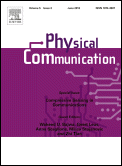
Physical Communication
Exploring the Dynamics of Communication SystemsPhysical Communication is a leading academic journal published by Elsevier, focusing on the innovative field of electrical and electronic engineering. With an ISSN of 1874-4907 and ranking in the Q2 category for 2023, this journal is recognized within the top tiers of its discipline, currently holding the 260th rank out of 797 in Scopus rankings, and situated in the 67th percentile. The journal seeks to disseminate high-quality research articles that explore various aspects of physical communication technologies and methodologies, providing a vital platform for academia and industry practitioners alike. Although it does not currently operate on an open access basis, the journal's emphasis on rigorous peer-review and high-impact content ensures that it remains a cornerstone for advancements in understanding the dynamic interplay between physical principles and communication technologies. Based in the Netherlands since its inception in 2008, Physical Communication aims to foster discussions that drive innovation in communication systems, thereby serving as an essential resource for researchers, professionals, and students dedicated to pushing the boundaries of this exciting field.

International Journal of Wireless Information Networks
Innovating Communication through Academic ExcellenceInternational Journal of Wireless Information Networks, published by Springer, is a premier outlet for scholarly research in the fields of wireless information and communication technologies. With an ISSN of 1068-9605 and an E-ISSN of 1572-8129, this journal has established itself as a significant contributor to the literature since its inception in 1994. As evaluated in 2023, it holds a commendable Q2 ranking in several categories, including Computer Networks and Communications, Electrical and Electronic Engineering, and Hardware and Architecture, reflecting its robust impact and relevance within the academic community. Furthermore, it is ranked within the top quartiles in Scopus, placing it in the 76th, 74th, and 73rd percentiles in relevant fields. While the journal does not currently offer open access options, it remains an essential resource for researchers, professionals, and students dedicated to advancing knowledge and innovation within wireless information networks. The authoritative content published within these pages positions the journal at the forefront of ongoing technological developments, making significant contributions to the field until at least 2024.

Digital Communications and Networks
Innovating the future of communication technologies.Digital Communications and Networks, published by KEAI PUBLISHING LTD, stands at the forefront of research in the rapidly evolving fields of communication, computer networks, and hardware architecture. Since its inception in 2015, this open access journal has been committed to disseminating high-quality, peer-reviewed articles that contribute to technological advancements and academic discourse in these critical domains. With an impressive Impact Factor and achieving Q1 Quartile rankings in its relevant categories for 2023, it has established itself as a vital resource for researchers, professionals, and students aiming to stay ahead in a competitive landscape. The journal's robust standing is reflected in its notable Scopus rankings, underscoring its influence in Computer Science and related fields. As we look toward the future, the journal continues to invite innovative research that shapes the digital communication landscape until 2024 and beyond.